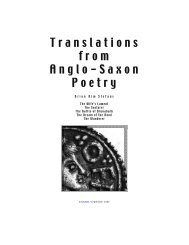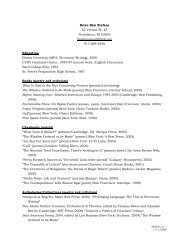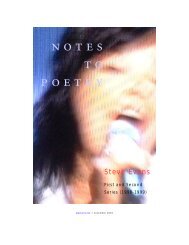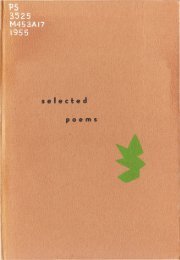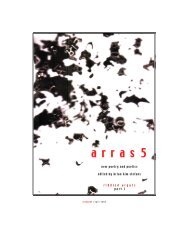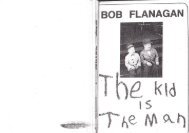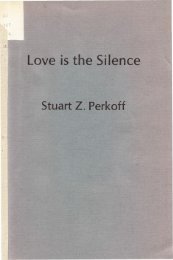new poetry and poetics edited by brian kim stefans - Arras.net
new poetry and poetics edited by brian kim stefans - Arras.net
new poetry and poetics edited by brian kim stefans - Arras.net
Create successful ePaper yourself
Turn your PDF publications into a flip-book with our unique Google optimized e-Paper software.
at best. & to describe a book such as Bruce Andrews’s _Wobbling_, say, as purely<br />
formal is to miss the exhilarating music, razor-sharp editing & varied social<br />
contents of that work. I think Steve Evans is making a very different point in his<br />
Postface, & I would agree with him about the recent banalization of language<br />
writing, in which, also, certain language writers themselves have played a part of<br />
late. To answer the last part of your question, there are, for me, enough younger<br />
writers who have moved thru language writing & refigured it for their own purposes<br />
(as opposed to dismissively <strong>by</strong>passing it) to keep me excited, not to mention<br />
those writers who haven’t felt the need to either accept or reject it, & those<br />
writers who simply don’t know what “it” is. &, while I could never agree that<br />
there is “little value in investigating [language-centered] <strong>poetics</strong>”, how does one<br />
make another take on board what they apparently don’t need, & should one,<br />
even, &, if so, why [cue O’Hara]–because it’ll improve them? for what? &c.<br />
BKS: What I find particularly striking about the chapbook “sore models” is not<br />
just the “polymorphously referential” (to borrow a term from your previous<br />
answer) nature of the individual pieces, but the varieties of types of reference that<br />
you employ. That is, more than being a text that includes a lot of social detail<br />
<strong>and</strong> a heterogensous lexicon, it moves into fictional situations <strong>and</strong> then out,<br />
seemingly autobiographical moments, quick-spliced collages that don’t surrender<br />
any narrativizable meanings, <strong>and</strong> frequently has moments that evoke a pastoral<br />
element, like in the first poem which starts: “the periphery of the field / threatens<br />
to increase / the little meadow / on my temples <strong>and</strong> my neck,” (is there a nod<br />
to Robert Duncan here?), or later, in the one dated “6/1/95,” which starts <strong>by</strong><br />
describing a sort of failed suicide with a butterknife: “a green salad hillside / salted<br />
with blossoms of mustard <strong>and</strong> thyme / pale farmworker triangles / an adverbial<br />
string / every potato / means alcohol for rockets.”<br />
Other modes that seem to arise are the coyly invective (“an internal convention<br />
/ plays the critic in the endlessly concerted person” in “10/2/95”, <strong>and</strong> the following<br />
poem, which contains the somewhat Luddite: “we adapt to the rigours of<br />
the disco / synchronised / to the slow chime of wristwatches, latches / a long<br />
memory of strange dawns / exp<strong>edited</strong> in fact / as part of a settlement with the<br />
day-to-day trading co.”), a really controlled, but precise surrealism (“we strolld<br />
through the forehead / <strong>and</strong> w<strong>and</strong>ered all night along the nerve-autobahns”), an<br />
ontological inquisitiveness (“this evening in the periscope / the scene is sharply<br />
focused / but our minds / are still obsessed with the larger picture”) <strong>and</strong> the oneline<br />
epigram, a form that I haven’t seen recognized just yet, but which reminds<br />
me of the “Chantre” of Alcools (“personality types herniate in soft chaffs of<br />
light,” for example).<br />
You wrote in your last answer of writers who have “moved through language<br />
writing & refigured it for their own purposes.” With that in mind, <strong>and</strong> the



